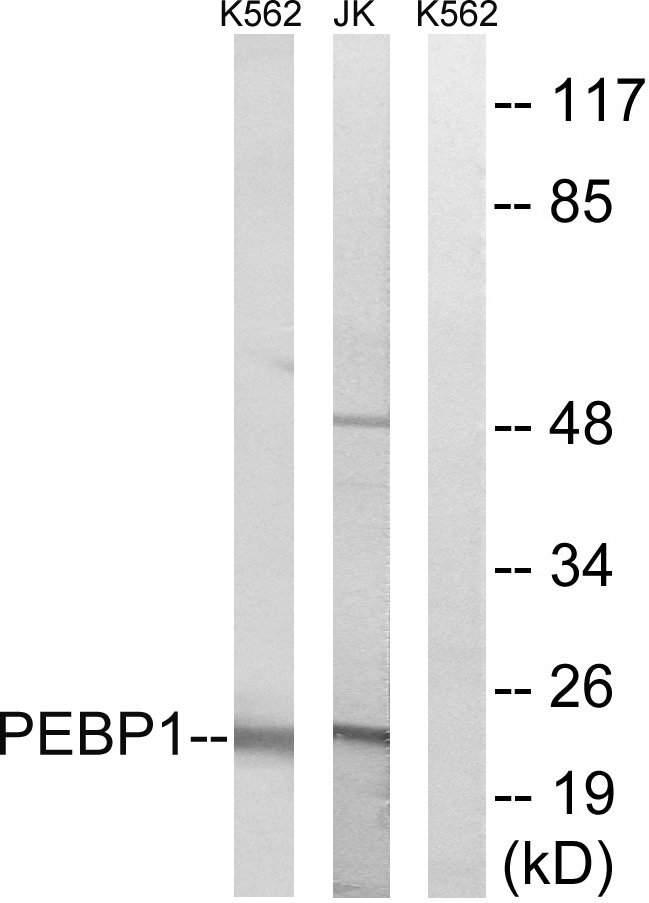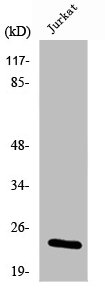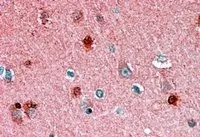![ICC/IF analysis of PFA-fixed PC-3M cells using GTX01163 RKIP antibody [SC58-09]. Green : primary antibody Blue : DAPI Permeabilization : 0.25% Triton X-100 in PBS ICC/IF analysis of PFA-fixed PC-3M cells using GTX01163 RKIP antibody [SC58-09]. Green : primary antibody Blue : DAPI Permeabilization : 0.25% Triton X-100 in PBS](https://www.genetex.com/upload/website/prouct_img/normal/GTX01163/GTX01163_20200303_ICC-IF_642_w_23053121_823.webp)
ICC/IF analysis of PFA-fixed PC-3M cells using GTX01163 RKIP antibody [SC58-09]. Green : primary antibody Blue : DAPI Permeabilization : 0.25% Triton X-100 in PBS
RKIP antibody [SC58-09]
GTX01163
ApplicationsImmunoFluorescence, Western Blot, ImmunoCytoChemistry, ImmunoHistoChemistry, ImmunoHistoChemistry Paraffin
Product group Antibodies
ReactivityHuman, Mouse
TargetPEBP1
Overview
- SupplierGeneTex
- Product NameRKIP antibody [SC58-09]
- Delivery Days Customer9
- Application Supplier NoteWB: 1:1000-1:5000. ICC/IF: 1:50-1:200. IHC-P: 1:50-1:200. *Optimal dilutions/concentrations should be determined by the researcher.Not tested in other applications.
- ApplicationsImmunoFluorescence, Western Blot, ImmunoCytoChemistry, ImmunoHistoChemistry, ImmunoHistoChemistry Paraffin
- CertificationResearch Use Only
- ClonalityMonoclonal
- Clone IDSC58-09
- Concentration1 mg/ml
- ConjugateUnconjugated
- Gene ID5037
- Target namePEBP1
- Target descriptionphosphatidylethanolamine binding protein 1
- Target synonymsHCNP, HCNPpp, HEL-210, HEL-S-34, HEL-S-96, PBP, PEBP, PEBP-1, RKIP, phosphatidylethanolamine-binding protein 1, Raf kinase inhibitory protein, epididymis luminal protein 210, epididymis secretory protein Li 34, epididymis secretory protein Li 96, hippocampal cholinergic neurostimulating peptide, neuropolypeptide h3, prostatic binding protein, raf kinase inhibitor protein
- HostRabbit
- IsotypeIgG
- Protein IDP30086
- Protein NamePhosphatidylethanolamine-binding protein 1
- Scientific DescriptionThis gene encodes a member of the phosphatidylethanolamine-binding family of proteins and has been shown to modulate multiple signaling pathways, including the MAP kinase (MAPK), NF-kappa B, and glycogen synthase kinase-3 (GSK-3) signaling pathways. The encoded protein can be further processed to form a smaller cleavage product, hippocampal cholinergic neurostimulating peptide (HCNP), which may be involved in neural development. This gene has been implicated in numerous human cancers and may act as a metastasis suppressor gene. Multiple pseudogenes of this gene have been identified in the genome. [provided by RefSeq, Jul 2015]
- ReactivityHuman, Mouse
- Storage Instruction-20°C or -80°C,2°C to 8°C
- UNSPSC41116161
References
- PKCdelta mediates mitochondrial ROS generation and oxidation of HSP60 to relieve RKIP inhibition on MAPK pathway for HCC progression. Mandal JP et al., 2021 Feb 1, Free Radic Biol MedRead this paper

![IHC-P analysis of mouse kidney tissue section using GTX01163 RKIP antibody [SC58-09]. IHC-P analysis of mouse kidney tissue section using GTX01163 RKIP antibody [SC58-09].](https://www.genetex.com/upload/website/prouct_img/normal/GTX01163/GTX01163_20200303_IHC-P_645_w_23053121_868.webp)
![Mouse tissue extract (50 μg) was separated by 12% SDS-PAGE, and the membrane was blotted with RKIP antibody [SC58-09] (GTX01163) diluted at 1:500. The HRP-conjugated anti-rabbit IgG antibody (GTX213110-01) was used to detect the primary antibody. Mouse tissue extract (50 μg) was separated by 12% SDS-PAGE, and the membrane was blotted with RKIP antibody [SC58-09] (GTX01163) diluted at 1:500. The HRP-conjugated anti-rabbit IgG antibody (GTX213110-01) was used to detect the primary antibody.](https://www.genetex.com/upload/website/prouct_img/normal/GTX01163/GTX01163_HJ0510_20200228_WB_M_brain_w_23053121_192.webp)
![Various whole cell extracts (30 μg) were separated by 12% SDS-PAGE, and the membrane was blotted with RKIP antibody [SC58-09] (GTX01163) diluted at 1:1000. The HRP-conjugated anti-rabbit IgG antibody (GTX213110-01) was used to detect the primary antibody. Corresponding RNA expression data for the same cell lines are based on Human Protein Atlas program. Various whole cell extracts (30 μg) were separated by 12% SDS-PAGE, and the membrane was blotted with RKIP antibody [SC58-09] (GTX01163) diluted at 1:1000. The HRP-conjugated anti-rabbit IgG antibody (GTX213110-01) was used to detect the primary antibody. Corresponding RNA expression data for the same cell lines are based on Human Protein Atlas program.](https://www.genetex.com/upload/website/prouct_img/normal/GTX01163/GTX01163_HJ0510_20200828_WB_TPM_watermark_w_23053121_682.webp)
![IHC-P analysis of human kidney tissue section using GTX01163 RKIP antibody [SC58-09]. IHC-P analysis of human kidney tissue section using GTX01163 RKIP antibody [SC58-09].](https://www.genetex.com/upload/website/prouct_img/normal/GTX01163/GTX01163_20200303_IHC-P_643_w_23053121_977.webp)
![IHC-P analysis of mouse brain tissue section using GTX01163 RKIP antibody [SC58-09]. IHC-P analysis of mouse brain tissue section using GTX01163 RKIP antibody [SC58-09].](https://www.genetex.com/upload/website/prouct_img/normal/GTX01163/GTX01163_20200303_IHC-P_644_w_23053121_686.webp)







![Various whole cell extracts (30 μg) were separated by 12% SDS-PAGE, and the membrane was blotted with RKIP antibody [GT1249] (GTX02846) diluted at 1:1000. The HRP-conjugated anti-rabbit IgG antibody (GTX213110-01) was used to detect the primary antibody. Corresponding RNA expression data for the same cell lines are based on Human Protein Atlas program.](https://www.genetex.com/upload/website/prouct_img/normal/GTX02846/GTX02846_4000000704_20210122_WB_2_TPM_watermark_w_23053123_720.webp)